At one minute past midnight today (December 21st 2021), The Women & Equalities Committee published its report in reply to the UK’s Government approach to the reform of the Gender Recognition Act 2004.
Unsurprisingly, the Committee has heavily criticised both the Government Equalities Office and the Equalities and Human Rights Commission (EHRC) for failing in their duties. It is a matter of fact that Liz Truss, Kemi Badenoch and Kishwer Falkner appears to hold gender-critical views and have no interest in supporting transgender people whatsoever.
Indeed we have evidence at Steph’s Place that proves Kishwer Falkner works very closely with trans hostile groups. We also have evidence that suggests that EHRC Board members may have broken guidelines regarding Conflict of Interest and that collaboration with trans hostile groups may well have taken place over the last two years. We have sent dossiers of our evidence to selected MP’s, legal advisors and the press.
We have absolutely no confidence in the EHRC being impartial.
The Women & Equalities Committee states:
“We condemn the negligible engagement with our inquiry by both the Government Equalities Office Ministers and the EHRC, and the delay in response to the consultation which further polarised and toxified the debate.”
In general, The Women & Equalities Committee’s (WEC) report broadly supports trans people and proper reform of the Gender Recognition Act.
Still, the fact remains that the trans hostile groups such as Womens Place UK, Filia, and Fair Play for Women have severely dented the hopes of trans people to achieve the same rights as enjoyed by some 700 million people in other countries. This includes Pakistan, Ireland and Argentina, to name just three of over twenty.
There is no doubt that the UK will remain well behind other western European countries regarding legal gender recognition thanks to manipulated transphobia under the cloak of “women’s rights” – rights that, in fact, we should all enjoy as a matter of human rights.
While the Westminster government rules out Self-Declaration (Scotland, of course, are going down this route), the report from the WEC makes strong recommendation to make some welcome improvements.
However, we doubt very much if there is the political will to see any positive changes – much more like that the EHRC and gender-critical elements of the government will seek to reduce rather than improve trans rights. The principal recommendations/statements are bolded below:
1:We consider the reduction in the fee for a Gender Recognition Certificate from £140 to £5 to be a step in the right direction. This new nominal amount will however contribute virtually nothing to the running of the Gender Recognition Certificate system and appears tokenistic. The Government’s consultation showed that there is support for removing the fee altogether. We recommend that the Government provide a response to this report explaining its rationale for reducing the fee from £140 to £5. (Paragraph 31)
2. We welcome the move to offer applicants a digital route. This will bring the process up to date with other Government services, which can be accessed online. The Government must ensure it is a system that can be accessed via smartphones as well as other devices. It will also need to offer a non-digitised route for those people who do not have access to the right technology and who feel more able to submit documents in hard copy. In response to this report the Government must set out and commit to placing the process online in the next six months. It should provide regular updates to stakeholders, including this Committee, on what stage the process is at and immediately clarify whether a non-digitalised system will continue to exist.
3. The wording of the statement by the Minister for Women and Equalities suggested that the three clinics she referred to were new initiatives, driven by the Government Equalities Office in response to its consultation. The three pilot clinics in question had, in fact, already been announced and were a product of planning by NHS England. It is not clear that the Government Equalities Office had any input into these pilots. The inclusion of the clinics in the consultation response statement served only as a distraction from the lack of any real change to the gender recognition process.
4. The length of time taken by the Government Equalities Office to respond to its own consultation is unacceptable. Not only did this delay exacerbate tensions between an already polarised group of stakeholders, but it also caused real distress to many within the transgender community. The Government’s own Consultation Principles make it clear that an explanation should be provided to stakeholders if a consultation response will not be issued within 12 weeks of the consultation closing. The GEO should have responded to its own consultation within the 12-week limitation, in line with the 2018 Government Consultation Principles document. Failing that, the GEO could and should have published a statement notifying stakeholders of its progress and reasons for the delay, especially given the sensitive nature of the consultation. It should have also indicated to stakeholders when a response was likely to be issued.
5. The Government’s reforms should improve the process for transgender people, whilst ensuring the appropriate safeguards for those with concerns. The Government should bring back an action plan for reform to the Gender Recognition Act within 12 weeks in those areas where there was a majority in support for it. This should be done specifically in relation to the spousal consent provision, the requirement to live in the acquired gender and the diagnosis of gender dysphoria.
6. Ministers are fundamentally accountable to Parliament and have a duty to make themselves available for scrutiny by the House and its committees. The same applies, with certain qualifications, to other public servants and public officeholders. We are deeply disappointed by the approach taken by both the Government Equalities Office and the Equality and Human Rights Commission to this inquiry. We understand that the subject of Gender Recognition Act reform is controversial, contested and difficult. That does not mean that key bodies should shy away from engaging with the challenges it presents, or from connecting with stakeholders who hold views on the matter. Indeed, it makes it even more important that we should do so. The refusal of Government Equalities Office Ministers to attend our evidence session and properly engage with our inquiry is inexcusable. We appreciate that the Equality and Human Rights Commission has a core function as an enforcer. It also, however, has a responsibility to provide information, influence policy and be a catalyst for change. In our view, the Commission has neglected to adequately fulfil these functions in relation to Gender Recognition Act reform. It is a matter of deep regret that the Government and its public bodies have chosen to evade Parliamentary scrutiny on this contentious subject.
7. The Government Equalities Office response to the consultation on the Gender Recognition Act was minimal and ignored areas where there was a majority in support for change. The Minister for Women and Equalities committed to reducing the fee, placing the process online and opening at least three new gender clinics in 2020. As the opening of the pilot clinics was already being driven by NHS England, the Minister truly only committed to reducing the fee and placing the process online.
8. We remain frustrated at the degree of engagement by the Government Equalities Office and the Equality and Human Rights Commission. These key bodies have a vital role to play in enforcing and enacting real change in this area. They should be willing to participate in ongoing discussions with this Committee about the concerns of its stakeholders. We condemn the negligible engagement with our inquiry by both the Government Equalities Office Ministers and the EHRC, and the delay in response to the consultation which further polarised and toxified the debate. We call on the Ministers of the Government Equalities Office and the leadership of the EHRC to restate their commitment to cooperating with this Committee in all future inquiries. We also call on the Leader of the House, the Speaker of the House and the Chair of the Liaison Committee to respond to the concerns we have raised and take action to ensure that the Ministers comply in future with these accountability procedures and the Ministerial Code. (Paragraph 75) The Gender Recognition Act 2004
9. We believe that the requirement of a diagnosis of gender dysphoria in order to obtain a Gender Recognition Certificate should be removed from the Gender Recognition Act, moving the process closer to a system of self-declaration. The legal recognition Reform of the Gender Recognition Act 73 process should not involve medical scrutiny but strong legal safeguards. Appropriate safeguards are essential to ensuring that the rights of natal women and the use of the single-sex and separate-sex exceptions in the Equality Act 2010 are protected. Therefore, it is appropriate to retain the statutory declaration, as well as introduce additional legal tests. It would also be possible to police statutory declarations more strictly and to bring prosecutions for fraudulent declarations if it becomes apparent that the person had no real intention of living in the acquired gender. (Paragraph 96)
10. The Government should remove the diagnosis of gender dysphoria from the Gender Recognition Act by 2023, reflecting the support for this in responses to its own consultation. It must ensure that appropriate safeguards are in place when doing so, including retaining the requirement for a statutory declaration. Robust guidance on how a system of self-declaration would work in practice should also be developed. For example, male prisoners with a record of sexual assault or domestic violence, who self-identify as a woman, should not be transferred to a woman’s prison.
11. There are significant problems with the requirement to have lived in the acquired gender. There is no clear, accepted or agreed definition of what living like a man or a woman is. This makes it difficult for a person to demonstrate whether they are masculine or feminine enough to obtain a Gender Recognition Certificate. The requirement also risks entrenching outdated and unacceptable gender stereotypes. The Government should remove the requirement to have lived for a set period of time in the acquired gender from the gender recognition process immediately.
12. The requirement for an applicant legally transitioning to complete a statutory declaration is an essential safeguard that ensures that they are doing so with genuine intent. We believe this requirement must be retained. We accept that there are cases where some individuals might regret their decision to legally transition. We recommend that the wording of the statutory declaration be amended to permit people who have legally changed their gender identity to reverse their decision, should they so choose by removing the ‘until death’ requirement.
13. We have carefully considered the arguments for and against the spousal consent provision. The choice to transition by one spouse can, for some, fundamentally change the nature of the relationship and the marriage contract. The spouse of the person transitioning must be informed of their spouse’s decision to change their legal sex. We understand the importance of the spousal consent provision and the availability of the option for annulment for some individuals, including those from religious communities where divorce and same-sex marriage is not regarded favourably. On balance, we do not believe that the lack of consent from a spouse to remain in the marriage after the legal transition should lead to a delay in an individual obtaining a full Gender Recognition Certificate. The current system places the burden for obtaining consent, or an annulment, on the parties to the marriage or civil partnership through the issue of an interim certificate. This has created delay and unfairness, which has led to trans people saying that this denies their basic rights and agency over their own bodies and places it in the hands of their spouses.
14. We recommend the requirement for spousal consent should be removed. When an application is made, the non-transitioning spouse should be notified by the body 74 Reform of the Gender Recognition Act processing the application (currently the Gender Recognition Panel) that their transitioning spouse has applied for a Certificate. The non-transitioning spouse should be given the option to either remain married/in a civil partnership or have the marriage/civil partnership annulled. If the spouse opts for an annulment or does not respond, the body granting the certificate should issue an annulment at the same time as a full Gender Recognition Certificate, subject to appropriate safeguards. The transitioning spouse should also have the option to annul the marriage or partnership but not before the granting body is satisfied that the non-transitioning spouse is aware of the process. The body issuing the certificate will need to be given the power to issue annulments. Any connected matters, such as applications by either spouse for a financial order, should be dealt with by the family courts.
15. We agree with the Government Equalities Office that the age of 18 is the appropriate age at which an individual should be able to decide on whether they want to apply for legal gender recognition. Part of the process of applying for legal recognition is making a statutory declaration. It would not be appropriate to expect a minor to accept that responsibility. The age of 18 is a suitable age for a person to consider the current and future ramifications of legally transitioning and to be asked to make a statutory declaration. This is consistent with the law relating to other long-term, legally binding undertakings.
16. We are aware that there has been a significant increase in the number of referrals to Gender Identity Development Services in recent years. We strongly believe that improved support is needed to help young people seeking to transition, especially mental health support. Young people should have access to services which work in tandem with gender identity clinics and allow them to discuss and explore their feelings about transitioning in detail. We welcome the work being undertaken in the Cass Review and look forward to reading its findings.
17. Transparency around the operation and decision-making of the Gender Recognition Panel is a concern to many people applying for a Gender Recognition Certificate. It is clear to us that the existence of the Panel itself can, at times, discourage people from applying for a GRC. We believe that another system should exist in place of the Gender Recognition Panel which allows for greater transparency. We note Scotland’s proposed changes to replace the Gender Recognition Panel with the Registrar General for Scotland and we believe this could be a move in the right direction. We heard conflicting evidence on whether the Gender Recognition Panel is providing the feedback that it is supposed to. We recommend that the Government conduct a review on whether the Gender Recognition Panel could be removed and replaced with the Registrar General for England and Wales, who already has a number of existing functions under the Gender Recognition Act. In the interim, more needs to be done to improve the transparency around the operation and role of the Panel. The GEO should satisfy itself that the Panel is carrying out its feedback requirements in line with the GRA and provide reassurance in response to this report. We recommend that the Government conduct a review on whether the Gender Recognition Panel could be removed and replaced with the Registrar General for England and Wales, who already has a number of existing functions under the Gender Recognition Act. In the interim, more needs to be done to improve the transparency around the operation Reform of the Gender Recognition Act 75 and role of the Panel. The GEO should satisfy itself that the Panel is carrying out its feedback requirements in line with the GRA and provide reassurance in response to this report
18. Section 22 of the Gender Recognition Act is important. It ensures the privacy of transgender people by making it a criminal offence for a person who has acquired information about a person’s GRC, in an official capacity, to disclose it without the transgender person’s consent (except in limited circumstances). No prosecution has been brought under this section so far. We are concerned to hear about the fears many working in an official capacity have in relation to this provision, and we are not convinced that in all cases those handling GRC’s should be subject to criminalisation where mistakes could be made. We recommend that the Government amends section 22 of the Gender Recognition Act to ensure that only cases where there is evidence that the disclosure was deliberate and knowing, are covered. The Equality Act 2010 and its interaction with the Gender Recognition Act 2004
19. We reiterate our predecessor Committee’s recommendation for better guidance on the single-sex and separate-sex exceptions and urge the Government Equalities Office and Equality and Human Rights Commission to publish this guidance, using worked examples and case studies from organisations providing these services. We also strongly recommend that the Government Equalities Office and Equality and Human Rights Commission urgently develop and publish guidance, in collaboration with trans rights groups, on best practice to provide trans and non-binary inclusive and specific services, including specifically relating to domestic violence and sexual abuse. This guidance should use worked examples and case studies from organisations providing these services.
20. We recommend that the Government Equalities Office conduct a review into the use of the occupational requirement exception and how it is currently being applied. This review should consider the role of the GRA and how it interacts with the Equality Act and employment laws, and make recommendations to strengthen protections for trans and gender non-conforming people at work. Measures of progress and targets must be set to reduce and eliminate gender-based discrimination in the workplace.
21. Guidance on the application of the sports exception continues to be confused and inadequate, leaving many sports providers feeling unclear about its application. The Sports Council Equality Group has produced some guidance to try and bridge this gap. However, both the Government Equalities Office and Equality and Human Rights Commission have a responsibility to provide clarity in this area. We recommend that the EHRC and GEO work with the Sports Council Equality Group to publish supplementary guidance that clearly and correctly addresses some of the main concerns sporting bodies have in relation to this exception, including under what circumstances it is acceptable to use the sports exception. We believe it is absolutely essential that the integrity of women’s sport is maintained and not compromised, and that nothing should happen in this space which would undermine that. In addition, 76 Reform of the Gender Recognition Act the EHRC and GEO must work with trans rights groups and sports providers to develop clear, evidence-based guidance with practical examples for how to facilitate trans and gender non-conforming inclusive spaces in sports.
22. The conflation of the terms sex and gender in both the Gender Recognition Act and Equality Act has led to widespread confusion and disagreement. We welcome the Equality and Human Rights Commission guidance on sex and gender reassignment and believe it is clear in explaining the rights of those who have acquired a GRC in relation to the protected characteristics in the Equality Act. However, there is more work to be done. The GEO should work to update the language in both acts in relation to sex and gender, ensuring consistency in the definitions used. It should be clear when an Act is referring to natal sex, legal sex and gender. The Government should also aim to update all official documents that conflate the terms sex and gender.
23. We recognise the importance of collecting and monitoring data on natal sex, especially in cases of equality monitoring. We also recognise the sensitives around collecting and monitoring data on natal sex and the distress it can cause trans and gender non-conforming people. The Government Equalities Office should work closely with trans rights groups and researchers The Government Equalities Office should work closely with trans rights groups and researchers to develop clear guidelines around data collection in relation to sex and gender, with the aim of minimising such distress, particularly for publicly funded or mandated data such as the census.
24. We commend the work undertaken by NHS England to open more gender identity clinics and welcome the announcement of the opening of a further two pilot clinics. We are, however, concerned to learn that waiting times for these clinics continue to be lengthy. There also appears to be a lack of clarity from NHS England over whether these pilot clinics will continue to remain open long-term. We recommend that the GEO works closely with the Department for Health and Social Care and NHS England to ensure that NHS England maintain the five pilot gender identity clinics unless or until the time that more permanent facilities with greater capacity, geographical scope and powers can be established. No facility should be closed without another opening in its place to ensure waiting times are reduced. Given that NHS England has opened five pilot clinics in the last two years, the Equalities Minister should secure additional funding to ensure significant steps will be made over the next two years to reduce waiting list times. The Minister should work closely with NHS England to continue to open facilities in under-resourced areas to tackle lengthy waiting lists and provide other much-needed services including mental health services. We would urge it to consider opening clinics in the West Midlands and the South West of England, given the lack of services in those regions.
25. NHS England should also consider more appropriate and effective responses and services to patients facing lengthy waiting list times than the current communications. This must include access to trans/gender non-conforming inclusive or specific mental health services. The GEO, DHSC and NHS England should provide this Committee Reform of the Gender Recognition Act 77 with annual updates on the progress of these developments, including the current pilot clinics, informing us of the impact they are having on waiting times and their targets to reduce them.
26. There is undoubtedly an urgent need for more trained and specialist clinicians who have the knowledge and understanding to work in the growing number of gender identity clinics. We welcome NHS England’s funding of a programme in gender dysphoria medicine. However, we are concerned that NHS England do not have enough specialist staff needed to run new clinics. We believe that there is a need to encourage NHS staff and medical students into this field in order to address the significant waiting times many people accessing these clinics face. The Department of Health and Social Care should work with NHS England to attract more trainee doctors to specialise in gender identity healthcare.
27. We are aware that the COVID-19 pandemic has made access to primary healthcare more difficult for everybody, including transgender and non-binary people. In her response to the Gender Recognition Act Consultation, the Minister for Women and Equalities argued that the most important concern for transgender people was the state of transgender healthcare. However, we have seen no evidence that the Government Equalities Office is working to improve transgender and non-binary people’s experience of primary healthcare.
28. The Government Equalities Office and Department for Health and Social Care should develop a healthcare strategy for transgender and non-binary people within the next year. The strategy should include: • improved and mandatory training for GPs around treating trans and nonbinary patients; • guidance for healthcare professionals, including how to communicate appropriately with patients who are trans or non-binary; • improved access to support services for trans and non-binary people. Both departments should set out how they will measure progress across each of these areas in order to improve the experiences of trans and non-binary people.
29. We welcome confirmation from the Department of Health and Social Care that the LGBT Action Plan is considered a point of reference for the Department. However, we are concerned that the Government Equalities Office appears to have abandoned it. This demonstrates how disjointed the Governments approach to LGBT+ issues is. It is also concerning that the GEO is ignoring the valuable experiences and concerns of LGBT+ people across the UK. The Government’s own LGBT Advisory Panel made it clear that the commitments in the LGBT Action Plan should continue to be implemented, before it was disbanded. The Government should commit at the earliest possible opportunity to continuing the implementation of the LGBT Action Plan across all departments. It should also reinstate its LGBT Advisory Panel, to demonstrate willingness to implement the actions outlined in the Plan – driven by the Reform of the Gender Recognition Act the data from the National LGBT Survey. We call on the Government to write to this Committee outlining the next steps in this work and providing a timetable by which they hope to achieve it.
30. When the previous Government launched its consultation into the reform of the Gender Recognition Act, it explicitly stated that one of its aims was to gather evidence to further advance equality for non-binary and intersex people. The LGBT Action Plan also made a commitment to improve the Government’s understanding of the issues faced by non-binary. The Government should clarify what the barriers are that prevent it from allowing non-binary people to be legally recognised. The Government should lay out reasons in writing to this Committee at the earliest possible opportunity, within a maximum of 12 weeks. The Equality and Human Rights Commission should undertake research in this area so that proposals to allow for legal recognition of nonbinary people can be brought forward during this parliament.
While to some extent the recommendations are welcome, in particular, the proposed withdrawal of medical diagnosis, the withdrawal of the “Real Life Experience Test” and changes to spousal consent we do have very serious concerns.
Our principal ones involve the internal agenda of the Government Equalities Office and the EHRC – for we repeat that these bodies are in our opinion ‘trans hostile’ and where the report suggests they work with the government to make updates (for example in the conflation between sex and gender) this could well prove to be detrimental to trans rights.
We are also concerned about how a report that should be centring on legal gender recognition expands to cover areas like trans health, sports and single-sex spaces.
Whilst trans health is of course important, just why is this being discussed in relation to GRA reformGRA Reform Gender Recognition Reform Bill - Scotland https://www.gov.scot/news/gender-recognition-reform-bill/ Published 03 March 2022 09:34 Part of Equality and rights Simplifying how trans people apply for a Gender Recognition Certificate. See Also https://mermaidsuk.org.uk/mermaids-manifesto-for-gra-reform/ https://www.stonewall.org.uk/what-does-uk-government-announcement-gender-recognition-act-mean ?
We believe that the issue of trans health care merits an enquiry in its own right.
The same principle applies to trans folk being excluded from sport. This is an issue for organisations like the IOC and global sports federations and has nothing to do with GRA reform and our sex on a birth certificate. We agree it is an issue that merits discussion, but that should be actioned by the relevant world experts.
And single-sex spaces? The conflation of GRA reform and the Equality Act 2010 just proves how successful gender-critical groups with allies from the right-wing press have been. In essence, they have manipulated themselves as “stakeholders” controlling OUR birth certificates.
We are also concerned that a known trans hostile MP – Jackie Doyle Price now sits on the WEC. While she perhaps joined the WEC too late to affect this report, what of the future?
But perhaps the bottom line is this. Yes, there are some reasonable suggestions in regard to GRA reform.
However, as mentioned we believe there is no ‘political will’ to advance trans rights from this Conservative government and we fear that the gender-critical elements will exploit the openings this report presents, to condemn transgender people to many more years of misery and the roll-back of trans human rights.
Steph, Claire, Paul, Julie & Nicola – Stephs Place co-editors.
For the opinions of Robin Moira White click HERE:




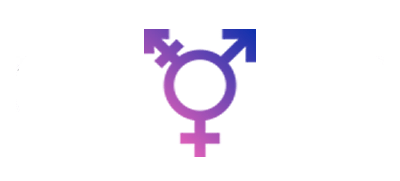
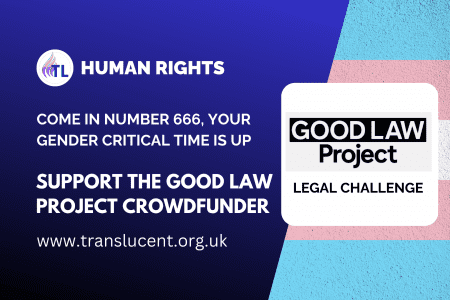
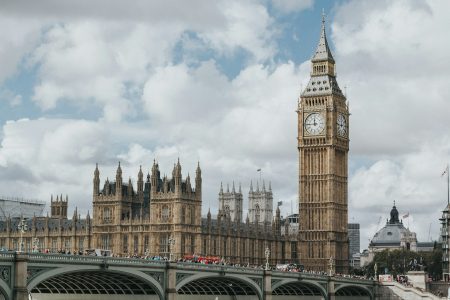
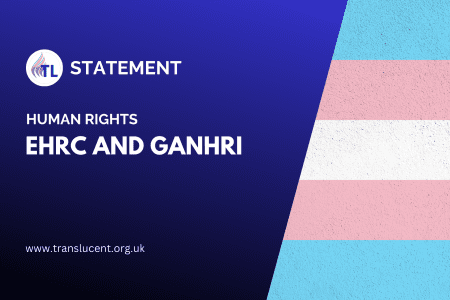
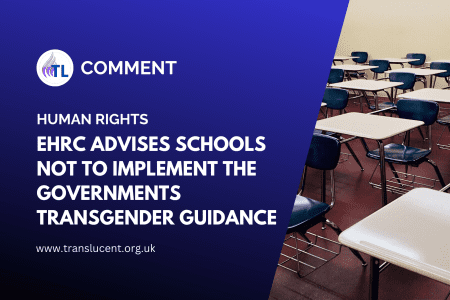
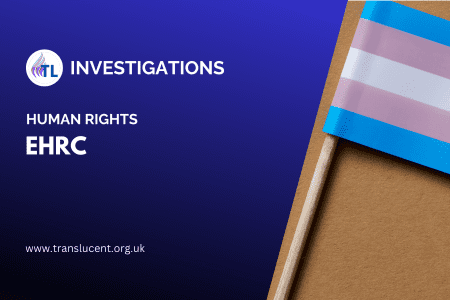
 To provide the best experiences, we use technologies like cookies to store and/or access device information. Consenting to these technologies will allow us to process data such as browsing behaviour or unique IDs on this site. Not consenting or withdrawing consent, may adversely affect certain features and functions.
To provide the best experiences, we use technologies like cookies to store and/or access device information. Consenting to these technologies will allow us to process data such as browsing behaviour or unique IDs on this site. Not consenting or withdrawing consent, may adversely affect certain features and functions.